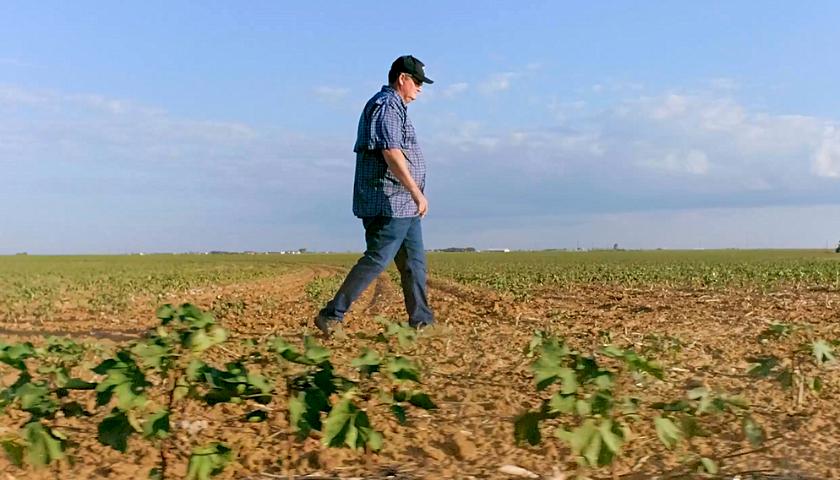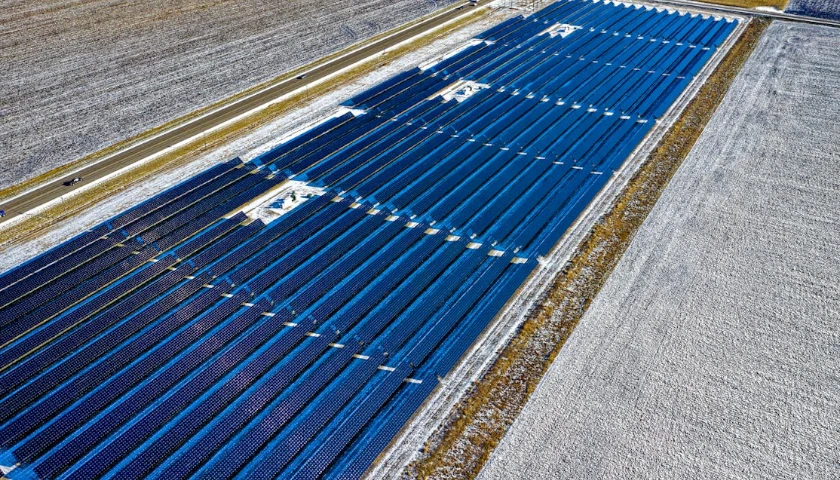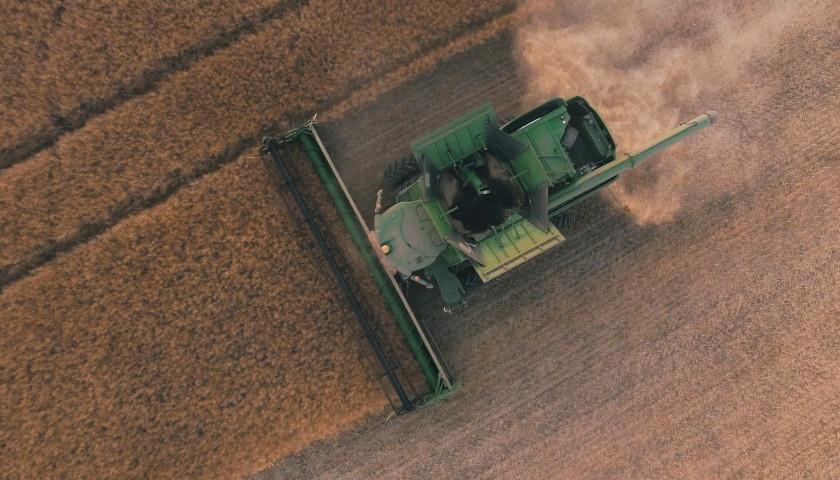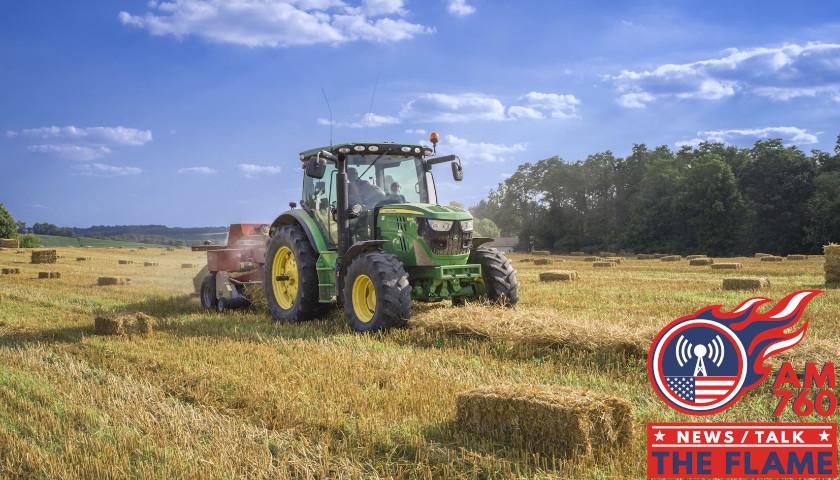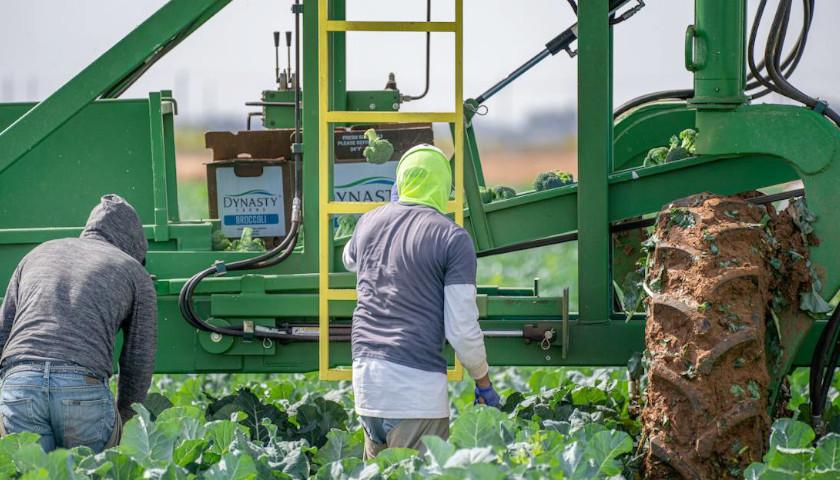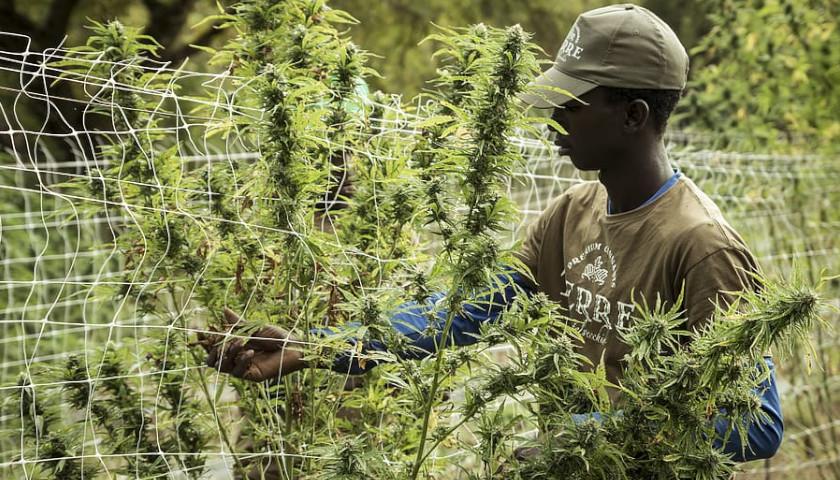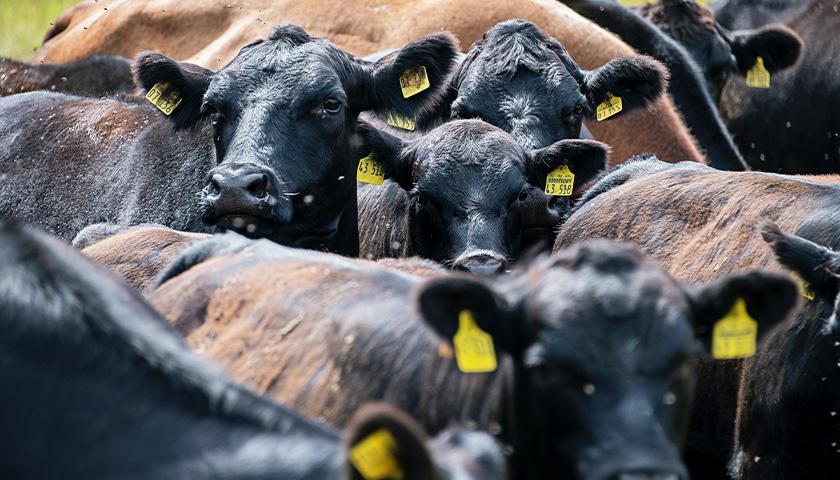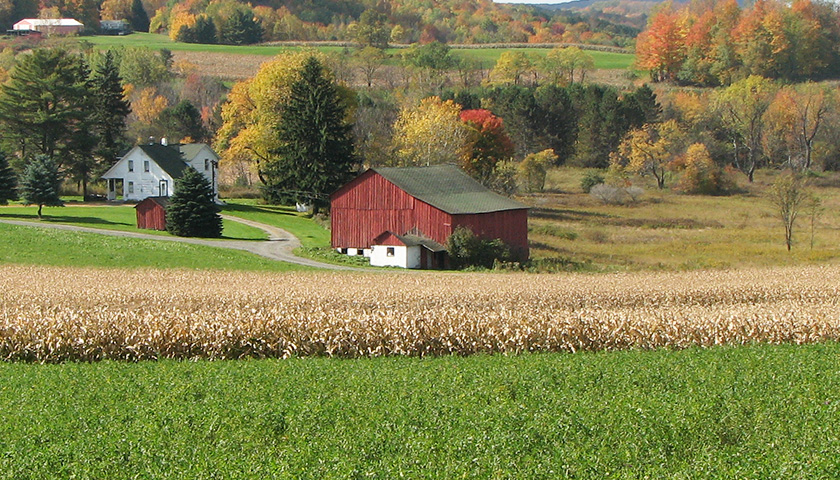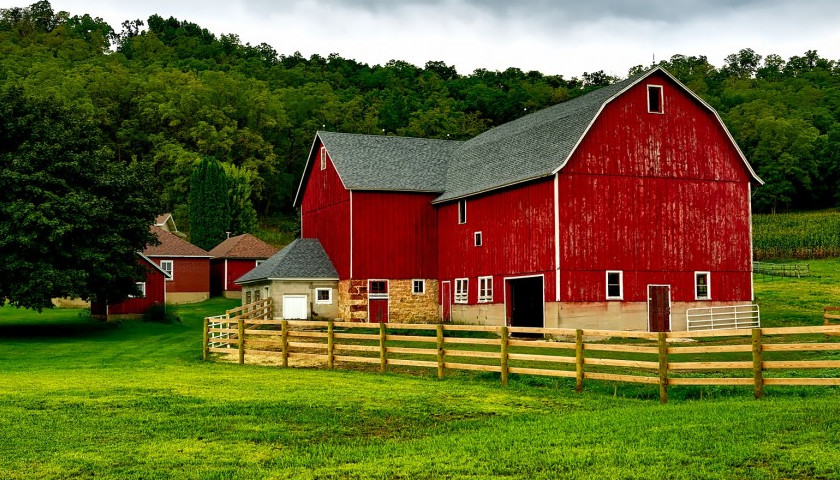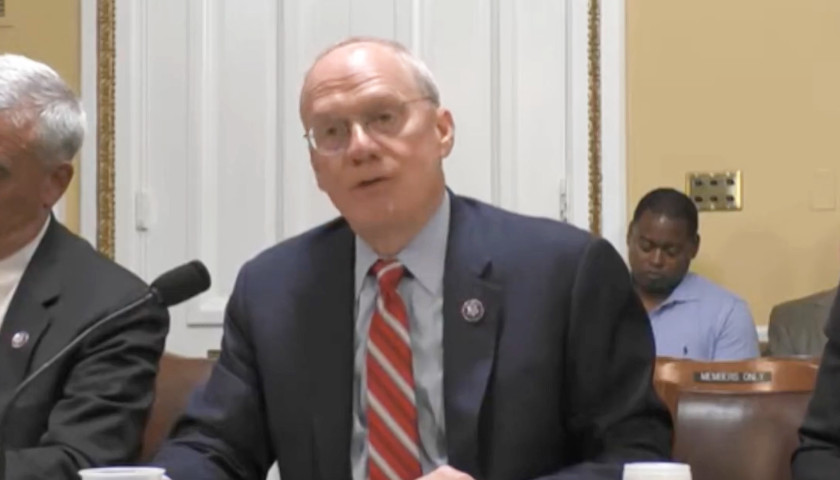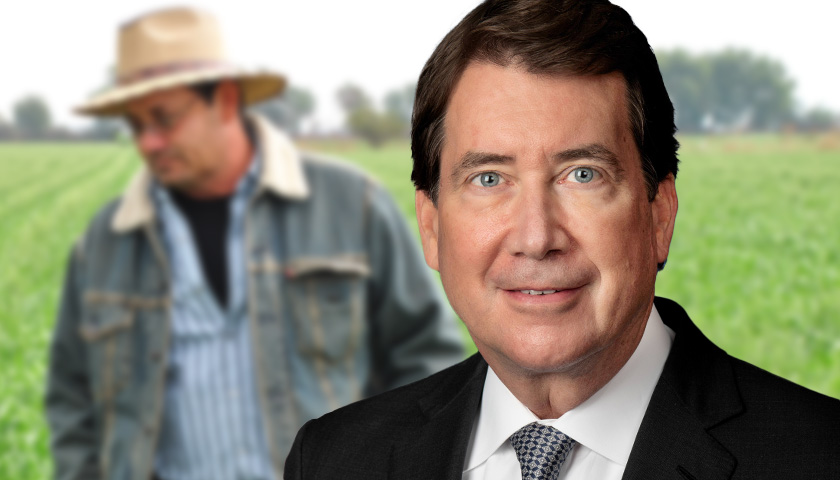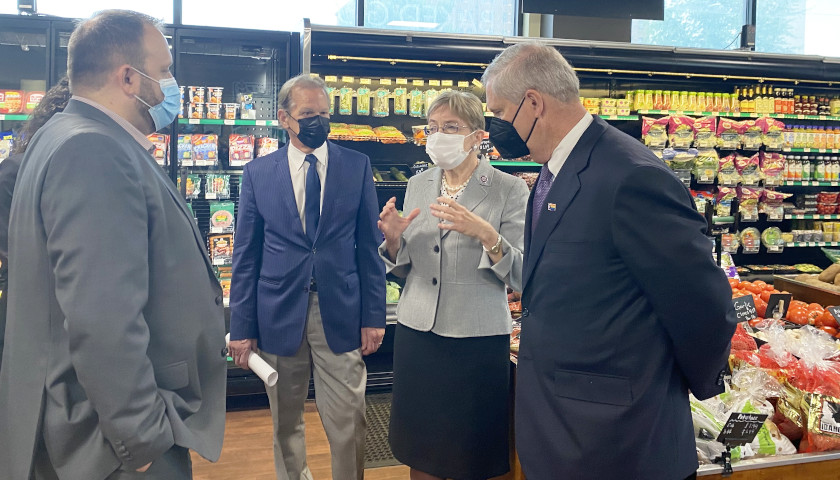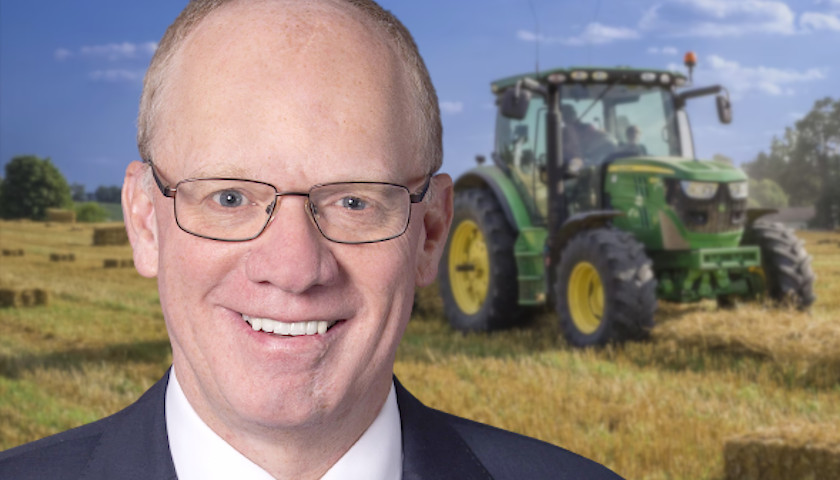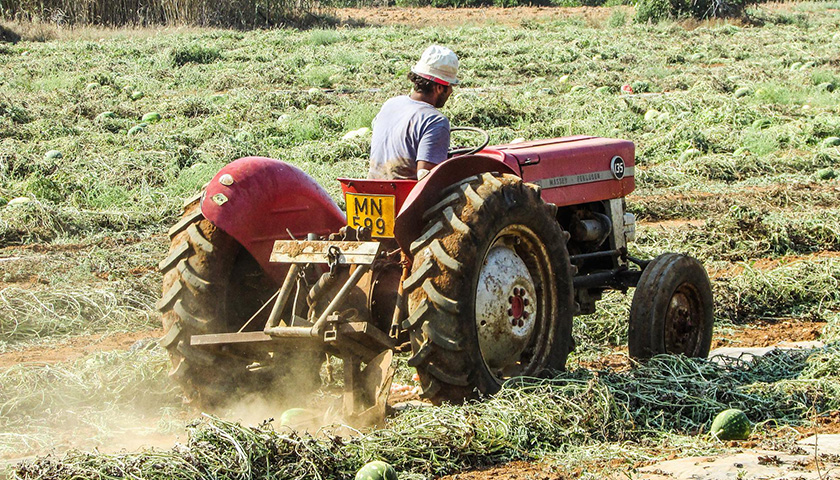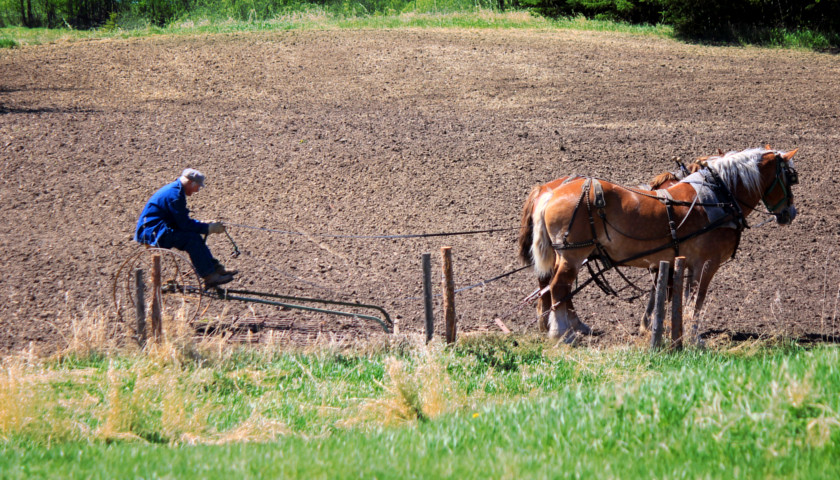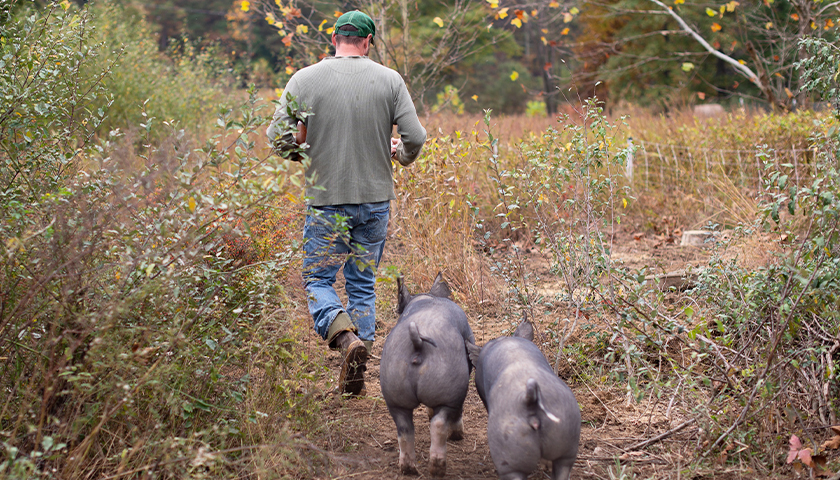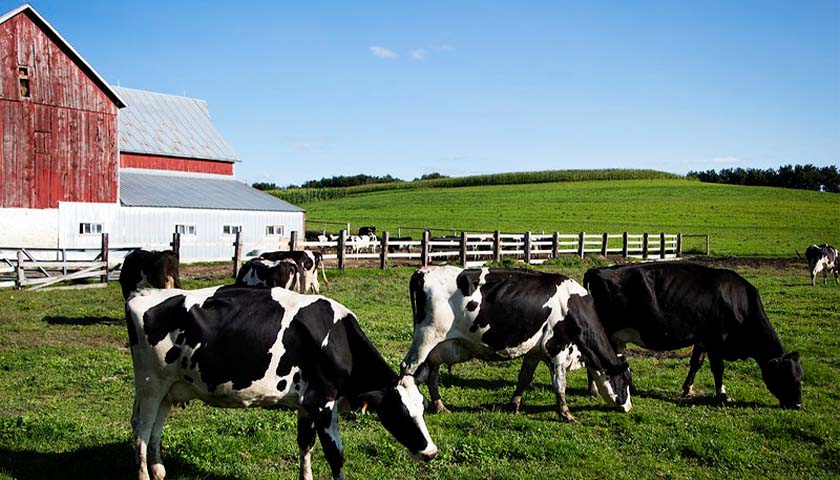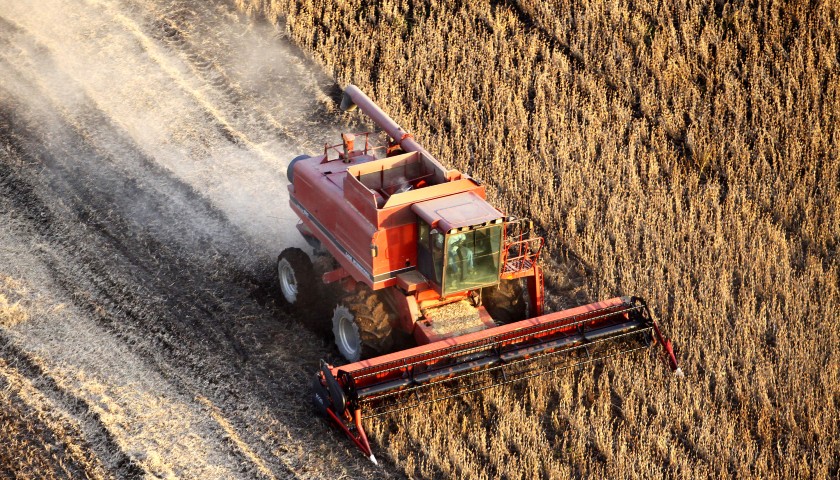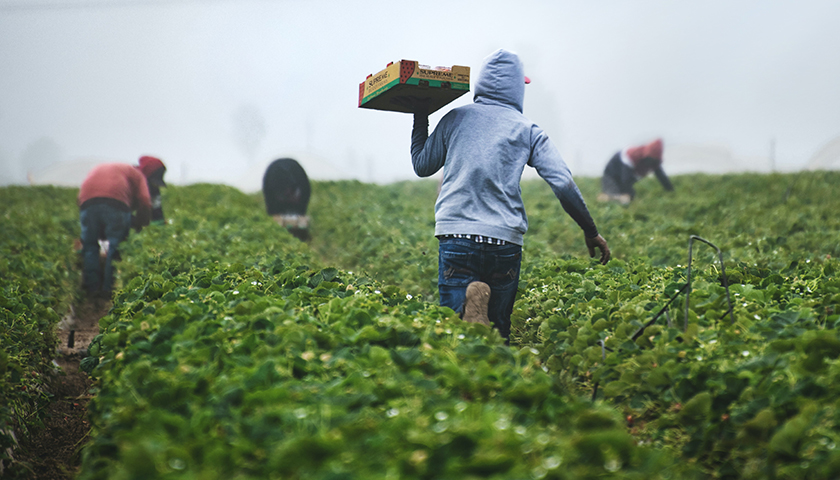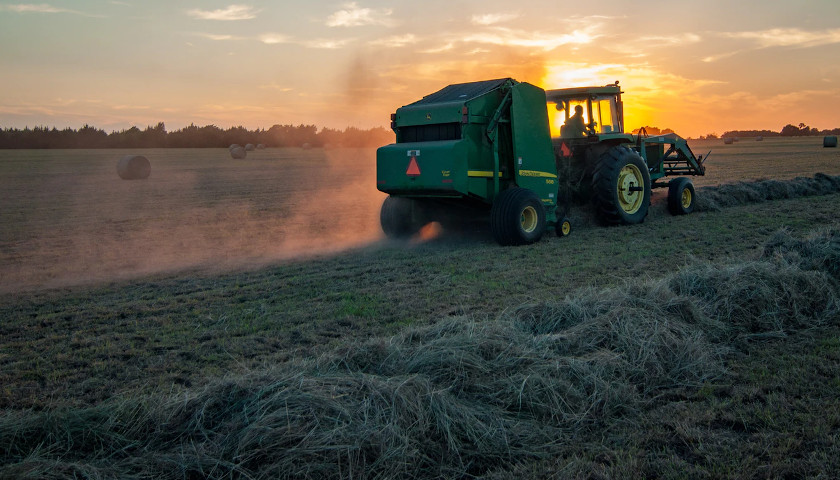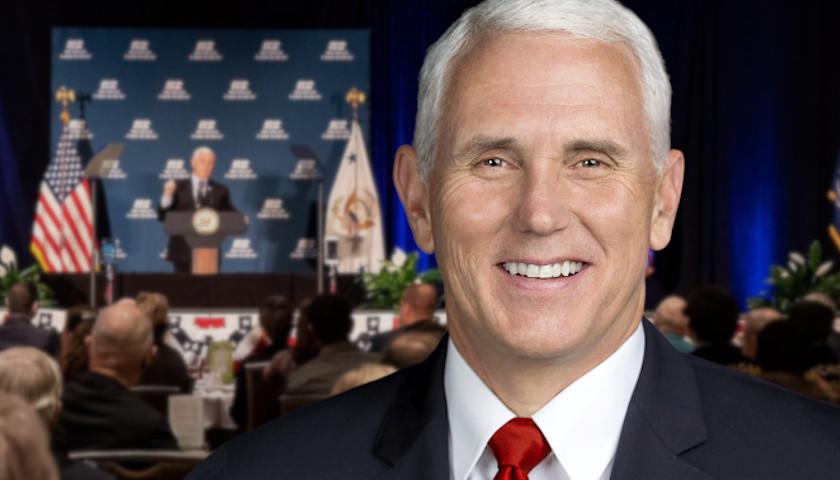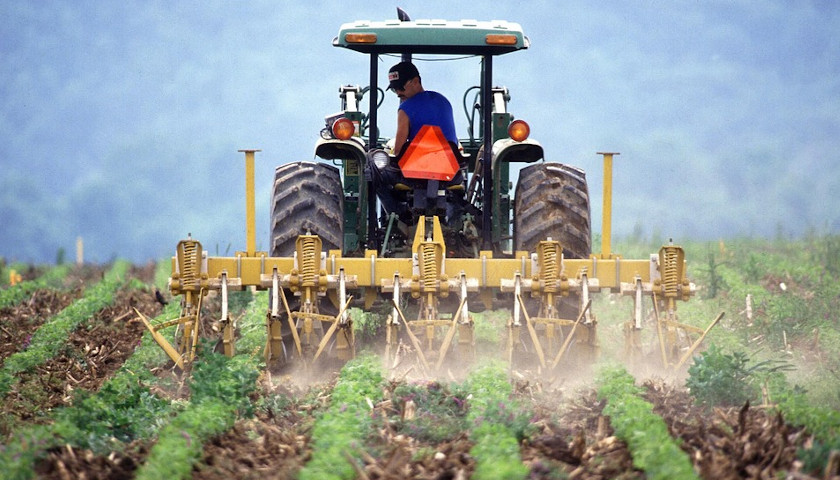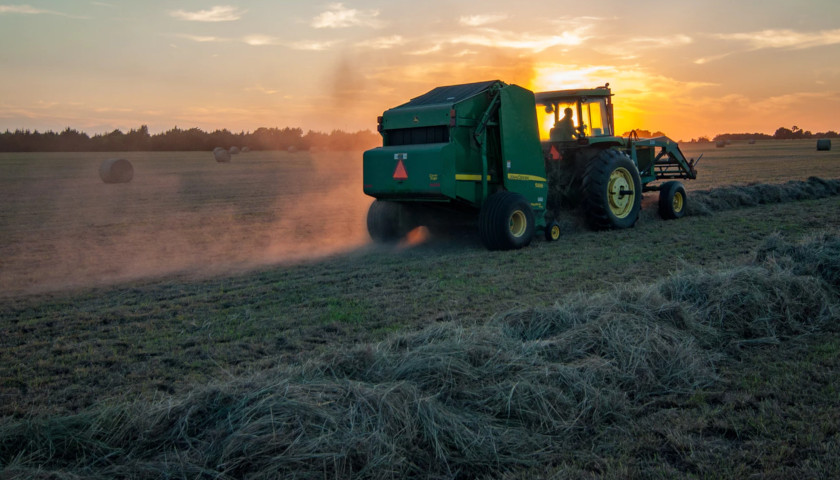All 11 members of the Tennessee congressional delegation sent a letter to congressional leadership on Monday requesting that adequate relief funds are appropriated for farmers impacted by Hurricane Helene last month
Read the full storyTag: Farmers
Purdue Survey Finds More Farmers Worried About Economy
Farmer pessimism about the economy is at its lowest in nearly a decade. That’s according to a recent survey conducted by the Purdue Center for Commercial Agriculture.
The Purdue University-CME Ag Economy Barometer Index for September was at 88. That’s down 12 points from the August survey and 25 from July’s results. It’s also down 18 points from where the index was a year ago, with growers’ concerns for both the future and present leading to steep drops in both subcategories.
Read the full storyCalifornia U.S. Rep. John Duarte Unveils Plan to Rescue Bankrupt Farmers from China’s Economic Assault
Republican California Rep. John Duarte unveiled his plan to save American farmers from possible financial ruin due to long-standing Chinese tariffs in an exclusive interview Wednesday with the Daily Caller News Foundation.
Read the full storySolar Developments Are Spreading Across America, Threatening Farmers and Local Communities
Fueled by massive federal subsidies in the Inflation Reduction Act (IRA), solar developers are looking to the wide open spaces of rural lands as the best places to site their projects. This is also where much of America’s farm and range land is located, as well as communities that like the existing look and character of their neighborhoods.
Last week, President Biden said of the IRA, “I’m proud to announce that my, uh, my investments, that through my investments, the most significant climate change law ever. And by the way, it is a $369 billion bill. It’s called the — uh, we, we should have named it what it was.”
Read the full storyReport Finds Farmers Growing More Concerned About Economy
U.S. farmers’ confidence in the economy cratered in April, according to the latest monthly report from Purdue University.
The Purdue University-CME Group Ag Economy Barometer for last month, which was released Tuesday, fell 15 points from March. At 99, the current score is the lowest the barometer has dropped since it reached 97 in June 2022.
Read the full storyCommentary: Biden EPA’s Latter-Day Prohibition Targets Auto Industry
Not since Prohibition has the federal government sought to ban a product as popular as the internal combustion engine.
This week, the Environmental Protection Agency released its final emissions standards rule, requiring that 70% of new vehicle sales be pure battery-powered electric or hybrids by 2032.
Read the full storyFederal Solar Subsidies Race on in Pennsylvania
As Republicans and Democrats stay split over Pennsylvania’s energy future, solar advocates want to pocket federal subsidies before they’re gone.
At a House Environmental Resources and Energy hearing on Monday, some legislators worried about the loss of farmland, as well as solar energy growth happening only due to hefty government incentives.
Read the full storyCommentary: We Must Protect Our Farmers
Tennessee’s farmers and growers generate $89 billion annually in economic activity. Simply put, we rely on our farmers. And today, we honor them. Few Americans make more of a difference in the lives of others than farmers. From growing the food we cook to the cotton we use to make clothes, our farmers truly are the backbone of our economy.
My greatest privilege in Congress is to serve the hardworking people of Tennessee, especially farmers. Those who work hard to feed our families, those who tirelessly labor sun-up to sun-down, those who make possible the American dream; it is their selfless sacrifice to the soil that keeps our state growing.
Read the full storyProtesting Farmers Successfully Bully EU into Scrapping New Environmental Regulations
The European Union (EU) is withdrawing a pesticide proposal amid protests by farmers against environmental regulations, The Associated Press reported.
European Commission President Ursula von der Leyen announced the decision Tuesday to suspend a regulation that aimed to cut pesticide and similar chemical use in half by 2030, according to The Guardian. The move is the latest concession by the EU to farmers who have staged sweeping protests across the member nations against environmental regulations they feel are hurting their livelihoods.
Read the full storyTom Pappert Details How ESG Standards Being Pushed by Banks Would ‘Bankrupt’ American Farmers
Tom Pappert, lead reporter for The Tennessee Star, joined Tuesday’s edition of The Tennessee Star Report with Michael Patrick Leahy to discuss his recent article on the Tennessee Agriculture Commissioner’s omission on a letter concerning Environmental, Social, and Governance (ESG) policies being pushed on American farmers.
On Tuesday, Pappert reported that Tennessee Agriculture Commissioner Dr. Charlie Hatcher did not sign a letter sent by 12 states to the heads of six elite banks warning that their “Net-Zero Banking Alliance” (NZBA) will force ESG policies that would have a “catastrophic impact” on farmers.
Read the full storyEuropean Farmers Continue Revolt Against Environmental Regulation by Blockading Port
Farmers in Belgium plan to block road access to the second-largest port in the country in protest of the European Union’s environmental regulations and cheap food imports, Reuters reported.
Farmers are planning to block access to Belgium’s North Sea port for at least 36 hours beginning on Tuesday, according to Reuters. The General Farmers Syndicate, the union representing the farmers, says they are targeting the port because they believe it is receiving financial support at the expense of domestic farmers.
Read the full storyGeorgia Agricultural Commissioner Asks Congress to Block Biden’s Pay Raise for Foreign Farm Workers
Georgia Agricultural Commissioner Tyler Harper released on Tuesday a letter he wrote to Georgia’s congressional delegation last month which urged them to pause the proposed wage increase for foreign farm labor, warning the raise would add millions in new labor costs for family-owned Georgia farms.
A press release revealed Harper warned in his letter that “the Biden administration’s proposed H-2A Program Adverse Effects Wage Rate increase for 2024” will “add an estimated $50 million to Georgia producer’s on-farm labor costs” over the year, and the “arbitrary increase” would come as farmers already face “sky-high input costs and inflation.”
Read the full storyCommentary: Farmers are Turning to an Ancient Practice to Improve Agriculture
From ancient Egypt to medieval England, cultivating one or more crops in the same field was common practice among many farmers for thousands of years. However, in the last century, food producers largely stopped ‘intercropping’ and moved towards an industrial type of agriculture – a shift that contributed to 34% of the world’s farmland being degraded today.
“Interest is growing in intercropping [again] because farmers increasingly understand it improves their soil health,” said Jerry Allford, an organic farmer and advisor from the Soil Association, a UK charity promoting sustainable agriculture. Jerry thinks this renewed focus can “open up a whole new way of farming” because it can bridge profitability with regenerative agriculture practices.
Read the full storyTennessee Department of Agriculture to Open Applications for Its Agricultural Enhancement Program in October
The Tennessee Department of Agriculture (TDA) announced Wednesday that its Agricultural Enhancement Program (TAEP) will begin accepting applications from farmers in October.
Read the full storyHemp and Pennsylvania’s ‘Bio-Based Future’
A circle of farmers in Pennsylvania have embraced hemp as state and federal money encourages growth of the industry.
With government support, farmers troubleshoot how hemp plays a role in the production of textiles, paper, automotive bio-composites, and construction projects.
Read the full storyAtlanta Man Sentenced to Federal Prison for Scamming Hemp Farmers Across Three States
An Atlanta man received three years in federal prison for his role in defrauding farmers in a hemp business venture, according to the District of South Carolina U.S. Attorney’s Office. Also, he was ordered to pay over $2 million in restitution.
Read the full storyFederal Legislation Pays Farmers for Cattle Killed by Endangered Wolf
American agricultural workers could soon receive financial compensation when their livestock gets killed by a wolf that advocates are hoping to increase in population.
Lawmakers introduced the Wolf and Livestock Fairness Act to Congress on April 18. The bill would provide financial compensation to farmers whose livestock are harmed by the endangered Mexican Grey Wolf species. The one clause; don’t kill the wolf.
Read the full storyFormer President Donald Trump Stumps in Iowa, Vows to Evict Biden from the White House and ‘Prevent World War III’
Former President Donald Trump was back in Iowa Monday night and he was loaded for bear, taking aim at woke liberals, the mainstream media, the Deep State, “Paul Ryan RINOs” and the current unpopular top resident of the White House.
And Trump, arguably the leading contender for the 2024 GOP presidential nomination, made the crowd packing Davenport’s 2,400-seat Adler Theatre some big promises. Chief among them: He’ll always have Iowa’s back and he’ll “stop World War III.”
Read the full storyCommentary: Climate Policies Will Shut Down Farmers
Belgian and Dutch farmers are protesting because they are losing their livelihoods in the name of fighting so-called climate change as European governments seek to reduce emissions of nitrogen oxide and ammonia, necessary inputs of modern agriculture. Will American farmers and consumers soon face the same fate?
European farmers are being told that because of the aim for “net-zero emissions” of greenhouse gases and other so-called pollutants in 2050, their industry is being phased out if they can’t adapt.
Read the full storyAgriculture Economists See Several Concerns for Farmers in 2023
Farmers aren’t likely to enjoy a calm year this year, according to agricultural economists from Purdue University.
After a year of dealing with historic inflation rates, farmers must now be prepared for an economic downturn that could spark a recession. However, there’s even more uncertainty across the horizon, said Roman Keeney, an associate professor of economics at Purdue’s College of Agriculture.
Read the full storyNew Law Waives State Sales and Use Tax on Some Farming Supplies and Equipment Purchases
The Tennessee Department of Revenue and the Tennessee Department of Agriculture has issued a public reminder noting that a new law that took effect in the new year made certain items tax-free for qualified farmers, timber harvesters, and nursery operators.
Read the full storyNew England Lawmakers Seek More Federal Drought Relief for Farmers
Congressional lawmakers in Connecticut and Rhode Island have teamed up to seek more federal relief funding to help New England livestock feed producers, and other farmers impacted by severe drought conditions.
In a letter to House and Senate budget leaders, members of congressional delegations from both states urged them to pump more money into relief programs, and expand eligibility to drought-wary forge farmers in the region, who they said are being left out of federal assistance programs.
Read the full storyFarmers Can Expect High Interest Rates and Higher Costs Next Year
Farmers borrow short term money up front every year to pay for inputs and operating expenses. At harvest time when they sell their crops, they pay back their operating notes.
For the first time in 20 years, fast-rising interest rates have doubled the cost of short term operating notes, an impact a lot of farmers have never seen before.
Read the full storyRep. Rose Slams Corporate ESG Policies in Congressional Testimony
A U.S. Congressman from Tennessee testified in front of the House Rules Committee, where he spoke against proposed government regulations regarding Environmental, Social and Governance (ESG) standards that he says will negatively impact farmers.
“I’d like to support by urging support for my bipartisan amendment, number 631, cosponsored by the gentlelady from Michigan, Representative Alyssa Slotkin, to prohibit the Securities and Exchange Commission from enforcing any provision on its rule making on enhanced standardization of climate-related disclosures for investors that would directly or indirectly require farmers to submit climate-related information to public companies or the SEC,” said Rep. John Rose (R-TN-06).
Read the full storySenator Hagerty Promotes Participation in Letter Telling SEC to Back Off ESG Regulation Affecting Farmers
Tennessee U.S. Senator Bill Hagerty touted his participation on Saturday in a letter signed by more than 30 senators to Securities and Exchange Commission Chairman Gary Gensler pushing back against a proposed Environmental, Social, and Governance (ESG) regulation that would harm America’s farmers.
The proposed rule is entitled, “Enhanced and Standardization of Climate-Related Disclosures for Investors.”
Read the full storyRNC Blasts Secretary of Agriculture Tom Vilsack’s Visit to Ohio
Secretary of Agriculture Tom Vilsack visited Toledo to tout a new $2 billion framework to improve the U.S. food supply chain, as the coronavirus pandemic has sent ripples through the economy.
According to the USDA, Vilsack’s framework will “transform the food system to benefit consumers, producers and rural communities by providing more options, increasing access, and creating new, more, and better markets for small and mid-size producers.”
Read the full storyRep. John Rose Leads Bipartisan Letter Defending Farmers Against New Environmental, Social, and Governance Investment Regulations
U.S. Representative John Rose (R-TN-06) led a bi-partisan letter to Securities and Exchange Commission Chair (SEC) Gary Gensler defending America’s farmers against a proposed new Environmental, Social, and Governance (ESG) regulation.
In March, the SEC proposed a new ESG rule that would require public companies to include “climate-related” disclosures in their registration statements and periodic reports.
Read the full storyMinnesota Farmers Are Far Behind Schedule This Planting Season
Minnesota farmers have been unable to plant nearly any wheat and have only planted a small amount of corn so far this year.
Last year, nearly all of Minnesota’s wheat (99%) was in the ground by mid-May, but per the most recent figures from the US Department of Agriculture (USDA), only 5% has been planted so far this year. Corn producers are having a similarly rough year thus far. Only 35% of Minnesota’s corn has been put in the ground so far. Normally by this time, almost double as much would have been planted according to the USDA.
Read the full storyReport: Biden Admin Mulls Environmental Regulations That Farmers Say Could Crush Agriculture Industry
The Biden administration is reportedly considering clamping down on a widely-used herbicide that farmers and industry groups have argued is key for maintaining low prices.
The Environmental Protection Agency (EPA) is considering tighter restrictions on the use of atrazine, a key herbicide often applied to corn, soybeans and sorghum, according to a March letter from the Triazine Network obtained by the Daily Caller News Foundation. The Triazine Network is a coalition of more than 20 industry groups including members of the National Corn Growers Association, the National Grain Sorghum Producers Association and the Florida Fruit and Vegetable Association.
Read the full storyFarmers Hit Hard by Price Increases as Food Price Spike Looms
Goods and services around the country are becoming increasingly more expensive, but farmers may be among the hardest hit as inflation, supply chain issues, and Russia’s invasion of Ukraine are expected to send food prices soaring even higher.
That impact is being felt by farmers around the country.
“The cost of fertilizer is up as much as 500% in some areas,” said Indiana Farm Bureau President Randy Kron. “It would be unbelievable if I hadn’t seen it for myself as I priced fertilizer for our farm in southern Indiana. Fertilizer is a global commodity and can be influenced by multiple market factors, including the situation in Ukraine, and all of these are helping to drive up costs.”
Read the full storyBona Fide Republican Natisha Brooks, Candidate for Tennessee’s 5th Congressional District, Discusses Her Background and Goals
Friday morning on The Tennessee Star Report, host Leahy welcomed a bonafide Republican candidate for Tennessee’s Fifth Congressional district, Natisha Brooks to talk about her background and campaign goals.
Read the full story2022 Mid-South Agricultural Trade Conference Set for March 3rd; Registration Ends February 20th
Farmers, agribusinesses, and agricultural leaders can learn about the significance of international trade on local agriculture production, markets, and economies at the 2022 Mid-South Agricultural Trade Conference on March 3, 2022, according to a press release by the Tennessee Department of Agriculture.
Read the full storyCommentary: It’s an Unraveling, Not a Reset
Last week the Wall Street Journal reported that a shortage of fertilizer is causing farms in the developing world to fail, threatening food shortages and hunger. Ironically, the lead photo is of mounds of phosphate fertilizer in a Russian warehouse.
Modern synthetic fertilizers are typically made using natural gas or from phosphorous-bearing ores. The former provides the nitrogen that is critical to re-use of fields in commercial agriculture. They constitute more than half of all synthetic fertilizer production.
So what happens when oil and natural gas extraction are crippled in industrialized nations? One likely outcome is that the fertilizer manufacturing industry is also crippled, leaving both large commercial growers and smaller farms around the world starved of a key substance they need to grow food for hungry populations.
Read the full storyIowa Farmers Prepare for California’s Prop 12
Hogs born Jan. 1, 2022, or later are subject to California’s Prop 12.
Some Iowa agricultural leaders have criticized the law, which prohibits the sale of pork from hogs that are the offspring of sows that were raised in pens with less than 24 square feet of usable floorspace per pig.
California accounts for about 15% of the U.S. pork market, the National Pork Producers Council said in a September news release. The NPPC is asking the U.S. Supreme Court to determine Prop 12’s constitutionality.
Read the full storyWisconsin Lawmakers Order Agriculture Export Plan by the End of 2021
Lawmakers in Madison are looking send a lot more of Wisconsin’s agricultural products around the globe.
The Joint Committee on Finance on Tuesday approved a $5 million, five-year plan that orders the Wisconsin Economic Development Corporation and the Department of Agriculture, Trade and Consumer Protection to come-up with a plan to increase ag exports in Wisconsin by 25%.
Read the full storyBiden Climate Pact Hobbles U.S. Manufacturing and Agriculture But Gives China, India, Russia a Pass
Some of the world’s top emitters of methane haven’t signed a global effort to curb how much of the greenhouse gas is emitted by 2030.
The three countries – China, Russia and India – that produce the most methane emissions in the world haven’t signed onto the pact, which has been spearheaded by the U.S. and European Union ahead of a major United Nations climate conference. The nations that have signed the agreement represent nearly 30% of global methane emissions, the State Department said Monday.
The U.S. and EU unveiled the Global Methane Pledge on Sept. 18, which they said would be key in the global fight against climate change. The U.K., Italy, Mexico and Argentina were among the seven other countries that immediately signed the agreement last month.
Read the full storyFlorida District Judge Halts Discriminatory Program by Biden Administration
Earlier this week, Florida District Judge Marcia Morales Howard issued a preliminary injunction in a lawsuit against the Biden administration. The lawsuit was initiated by a farmer who said a debt relief program to “socially disadvantaged farmers” is discriminatory.
In the $1.9 billion stimulus packaged signed by Biden earlier this year, approximately $4 billion of the plan is designated to assist exclusively farmers of color for debt relief through direct payments up to 120 percent of the farmer’s outstanding debt.
The order by Howard prevents the USDA from distributing the payments directly to farmers enrolled in the program.
Read the full storySupreme Court Rules in Favor of Nestle, Cargill in Human Rights Lawsuit
The Supreme Court ruled Thursday that Nestle USA and Cargill could not be sued for alleged human rights abuses that occurred overseas.
The plaintiffs, six Mali citizens enslaved as children on Ivory Coast cocoa farms supplying the food giants, sued Nestle and Cargill for damages, alleging the companies had aided and profited from child labor. The court ruled the corporations could not be sued for the overseas abuses.
“Nearly all the conduct they allege aided and abetted forced labor—providing training, equipment, and cash to overseas farmers—occurred in the Ivory Coast,” Justice Clarence Thomas wrote in the majority opinion.
Read the full storyCommentary: Are Race-Based Government Programs on the Verge of Extinction?
United States District Judge William C. Griesbach sustained a motion last week for a temporary restraining order to block a program under the Department of Agriculture to forgive certain government loans for farmers belonging to at least one “socially disadvantaged group.” The Department of Agriculture identified groups eligible for this classification as “a group whose members have been subjected to racial or ethnic prejudice because of their identity as members of a group without regard to their individual qualities . . . one or more of the following: Black/African American, American Indian, Alaskan native, Hispanic/Latino, Asian, or Pacific Islander.”
Read the full storyJudge Halts Debt Relief Program for Farmers of Color After White Farmers Sue
A federal judge Thursday afternoon suspended a loan forgiveness program that issues relief to farmers and agricultural workers of color.
Judge William Griesbach of Wisconsin’s Eastern District handed down a temporary restraining order after the conservative Wisconsin Institute for Law and Liberty (WILL) filed a lawsuit in April. The group alleged in its announcement that President Joe Biden’s relief program was unconstitutional and that white farmers should have been included in the loan program.
“The Court recognized that the federal government’s plan to condition and allocate benefits on the basis of race raises grave constitutional concerns and threatens our clients with irreparable harm, said Rick Esenberg, WILL’s president and general counsel, in a press release Thursday. “The Biden administration is radically undermining bedrock principles of equality under the law.”
Read the full storyFive White Farmers Sue over Loan Forgiveness Only for Blacks, Other Minorities
Christopher Baird owns a dairy farm near Ferryville in southwest Wisconsin, not far from the Mississippi River. He milks about 50 cows and farms approximately 80 acres of pasture.
Like a lot of farmers, Baird has direct loans through the U.S. Department of Agriculture’s Farm Service Agency.
But the dairy farmer isn’t entitled to a new FSA loan-forgiveness program provided as part of COVID-19 relief in the $2 trillion American Rescue Plan Act, legislation touted Wednesday night by President Joe Biden in his address to Congress.
Baird is white. He joined four other white farmers Thursday in suing federal officials over being left out.
Read the full storyLawmaker Says Biofuel Tax Credit Will Benefit Ohio Drivers, Farmers
From Lake Erie to the Ohio River, acres upon acres of vast cornfields blanket Ohio’s countryside, and an Ohio lawmaker wants state drivers to take advantage of the crop when they fill up their tanks.
Rep. Riordan McClain, R-Upper Sandusky, has introduced a bill in the Ohio House that would create a temporary, nonrefundable tax credit on the sale of E15 and higher blended biofuels of 5 cents a gallon.
Read the full storyCommentary: The Virus Is Not Invincible, But It’s Exposing Who’s Irreplaceable
In all the gloom and doom, and media-driven nihilism, there is actually an array of good news. As many predicted, as testing spreads, and we get a better idea of the actual number and nature of cases, the death rate from coronavirus slowly but also seems to steadily decline.
Read the full storyCommentary: The Renewable Fuel Standard is not ‘Pro-Farmer’
With the election around the corner, the D.C. swamp is hard at work. Various special interests are trying to make their pet issue look like an election asset or liability. One interest group working overtime is the biofuel lobby. The federal Renewable Fuel Standard – or RFS – is often falsely labeled as a “pro-farmer” energy policy that helps the Heartland.
Read the full storyCommentary: The Virus Is Not Invincible, But It’s Exposing Who’s Irreplaceable
In all the gloom and doom, and media-driven nihilism, there is actually an array of good news. As many predicted, as testing spreads, and we get a better idea of the actual number and nature of cases, the death rate from coronavirus slowly but also seems to steadily decline.
Early estimates from the World Health Organization and the modeling of pessimists of a constant 4 percent death rate for those infected with the virus are for now proving exaggerated for the United States. More likely, as testing spreads, our fatality rates could descend to near 1 percent.
Read the full storyVP Pence to Michigan Farm Bureau: Trump Administration Is ‘Unleashing Full Potential of American Economy’
Addressing the Michigan Farm Bureau (MFB) Tuesday, Vice President Mike Pence touted the Trump administration’s accomplishments in helping the state’s agricultural community and thanked farmers for staying strong during tough times.
Read the full storyCommentary: Minneapolis Star Tribune Gaslights Readers on Farmer Support for the President Trump
The Star Tribune just ran an article titled, “A test on the farm: Minnesota farmers struggling with low prices amid tariffs weigh their support for Trump.”
Read the full storyBillionaire Michael Bloomberg to Visit Minnesotans ‘Shortchanged by Donald Trump’ Wednesday
Michael Bloomberg’s presidential campaign announced Tuesday that the Democratic billionaire will make a campaign stop in Minnesota to discuss policies for people “shortchanged by Donald Trump.”
Read the full storyMichigan Gov. Whitmer Requests Farm Bailout from Federal Government Because of Weather
by Tyler Arnold Michigan Gov. Gretchen Whitmer is seeking federal funding for farms in her state because of the struggles farmers are facing from an unusual wet period and other issues with the weather. “Michigan farmers are in a state of crisis right now because of extraordinary weather conditions, from historic rainfall, extreme cold, excessive snow, flash flooding, and tornadoes,” Whitmer said in a news release. “Michigan has a rich history in agriculture, and on behalf of our farmers, our families, and our economy, we need to take action now. I’m ready and eager to partner with the federal government to make sure Michigan farmers have the support they need during this difficult time.” In a letter to U.S. Agriculture Secretary Sonny Perdue, Whitmer requested that the department give Michigan a USDA Secretarial Disaster Designation and more flexibility – and the ability to apply for aid – under the Federal Crop Insurance Program and Congress’s disaster legislation. Michigan received 37.9 inches of rain between May 1, 2018 and April 30, 2019, which is the third wettest year recorded in state history. Whitmer said that this has led to oversaturated topsoil, which prevented farmers from planting their fields and harvesting…
Read the full story


